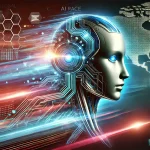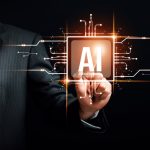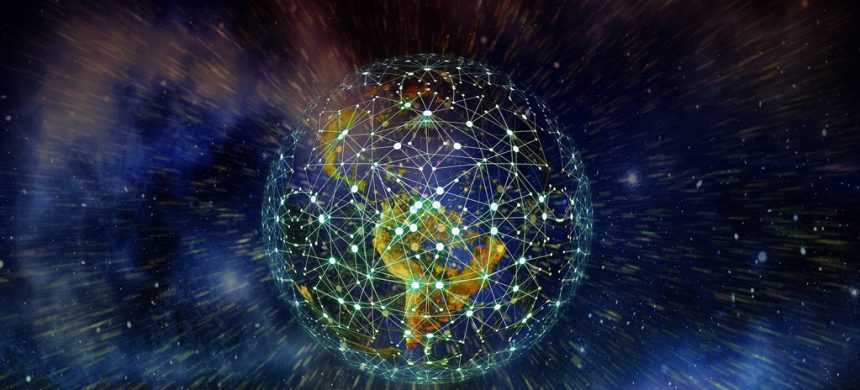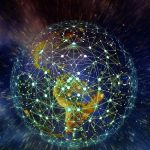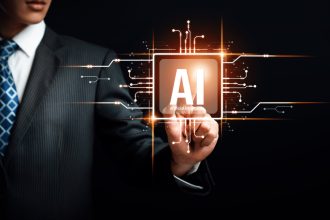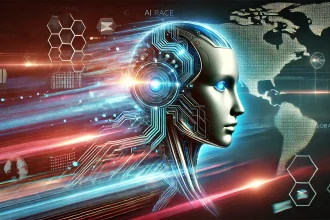A New Kind of Cold War
In the twenty-first century, power no longer depends on the size of an army or the number of nuclear weapons. It now lies in algorithms, data, and computational capability. The race for artificial intelligence dominance has emerged as the defining geopolitical competition of our time. The United States, China, the European Union, and a rising coalition of tech-driven nations are engaged in a silent war — not with missiles, but with code.
Governments around the world are investing billions in AI infrastructure, research, and defense applications. Every innovation, from autonomous drones to predictive intelligence systems, adds a new dimension to global influence. Unlike traditional warfare, this new battlefield exists in digital space, where information, surveillance, and automation redefine what it means to control power.
The United States: Innovation as Strategy
America continues to lead the global AI race through its unmatched ecosystem of technology giants — Google, OpenAI, Microsoft, and Nvidia. Silicon Valley has become a strategic asset, serving as the nerve center for innovation that extends into military, economic, and cultural power. The U.S. government’s collaboration with private tech companies is no longer optional; it is essential to maintain dominance.
Defense programs like Project Maven and the Pentagon’s AI Task Force aim to integrate machine learning into national security frameworks. Meanwhile, private innovation fuels civilian progress — autonomous vehicles, intelligent healthcare, and generative AI tools. Yet, this collaboration blurs the line between public interest and corporate ambition. Critics warn that America’s AI leadership risks being monopolized by tech elites, creating a concentration of digital power that echoes the monopolies of the industrial age.
China: The Rise of Algorithmic Authoritarianism
China has taken a different path. Its approach to AI combines centralized control with massive investment and national ambition. The Chinese Communist Party views artificial intelligence not merely as a tool for innovation but as a mechanism for governance. The state’s integration of AI into surveillance systems, citizen scoring, and predictive policing has turned technology into an instrument of political control.
Companies like Baidu, Tencent, and Huawei are at the forefront of AI research, backed by the government’s Made in China 2025 initiative. This model — where the state and corporations function as one — has accelerated China’s technological rise. The country’s vast access to data and its ability to deploy AI at scale provide an edge few others can match. Yet, the moral implications of such control challenge the principles of privacy, freedom, and democracy.
Europe: The Ethical Superpower
While the United States and China compete for dominance, Europe is carving its own identity as the world’s ethical AI regulator. Through legislation like the EU AI Act and the General Data Protection Regulation (GDPR), Europe is positioning itself as the global conscience of technology. Its goal is not to dominate but to define what responsible innovation looks like.
This approach prioritizes human rights, accountability, and transparency. Yet, critics argue that strict regulation could slow innovation and weaken Europe’s competitive edge. The continent’s challenge lies in balancing moral leadership with technological progress. In doing so, Europe may become the world’s most trusted — if not the most powerful — AI player.
The New Digital Alliances
Beyond the major powers, a new network of digital alliances is emerging. Nations like Japan, South Korea, and India are developing their own AI ecosystems, often aligning strategically with Western or Eastern blocs. Japan’s focus on robotics, South Korea’s AI-driven manufacturing, and India’s push toward data sovereignty reflect a multipolar technological world.
Meanwhile, the Gulf nations are investing heavily in AI to diversify their oil-dependent economies. The United Arab Emirates and Saudi Arabia have become global hubs for data centers, robotics research, and AI-based governance. Their investments signal a future where digital power defines national influence just as much as natural resources once did.
Cybersecurity and the Weaponization of AI
AI’s power extends beyond innovation; it also represents a new frontier in security and warfare. Autonomous weapons, disinformation campaigns, and AI-generated cyberattacks are rewriting military strategy. The ability to manipulate digital infrastructure or influence public opinion through artificial intelligence gives nations a form of power that is invisible but devastating.
Cybersecurity experts warn that AI could enable large-scale disruptions of financial systems, communication networks, and even democratic elections. Deepfake technology, for example, can fabricate political speeches or generate fake news with alarming realism. As trust becomes the ultimate casualty, societies must learn to defend themselves not just with firewalls, but with critical thinking and media literacy.
Tech Companies as Global Powers
What makes this new era distinct is the rise of corporations as geopolitical actors. Companies like Microsoft, Google, and Tencent wield influence comparable to that of small nations. They negotiate directly with governments, shape policy discussions, and determine the flow of digital information.
This unprecedented corporate power introduces complex ethical questions. Should companies that design algorithms capable of influencing billions be regulated like governments? How can societies ensure that the interests of citizens are not overshadowed by corporate profit motives? The debate continues to intensify as AI development accelerates without a unified global framework.
Human Identity in an AI World
Beyond politics and economics, AI is transforming the human experience itself. As machines learn to imitate thought, creativity, and emotion, the line between human and artificial intelligence begins to blur. From AI-generated music and art to intelligent virtual companions, humanity faces a new existential question: what does it mean to be human in a world run by algorithms?
Education, employment, and ethics must all adapt. The next generation will need not only technical skills but also moral clarity. As automation replaces traditional labor, the challenge lies in creating systems that prioritize human dignity and inclusion.
FAQs
How does AI affect global politics?
Artificial intelligence has become a strategic tool for national security, economic dominance, and social control. Nations with advanced AI capabilities hold greater geopolitical leverage.
Why is China’s AI model controversial?
China’s use of AI for mass surveillance and social governance raises ethical concerns about privacy and human rights.
Is Europe falling behind in the AI race?
While Europe lags in speed, it leads in ethical regulation. Its influence lies in setting global standards rather than building the fastest systems.
Can AI trigger a new form of warfare?
Yes, AI-driven cyberattacks, disinformation campaigns, and autonomous weapons represent the next evolution of conflict — one that operates largely in the digital realm.
What role do tech corporations play in geopolitics?
Tech companies now act as global power brokers, influencing governments, economies, and even democratic institutions through data and innovation.
Conclusion
The AI race is not just about technology — it is about the future of civilization. As nations compete for algorithmic supremacy, humanity stands at a crossroads between innovation and control, empowerment and exploitation. The winners of this race will not simply command markets; they will shape the moral and political architecture of the world.
For all its promise, artificial intelligence carries a profound responsibility. The decisions made today will determine whether AI becomes a force for progress or a tool of domination. In this new age of digital power, wisdom — not speed — will define true leadership.



